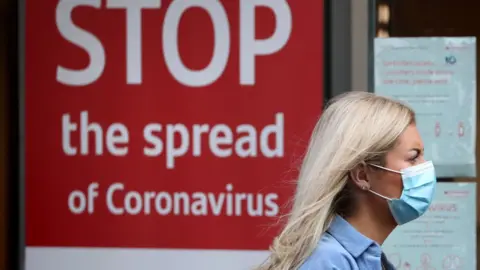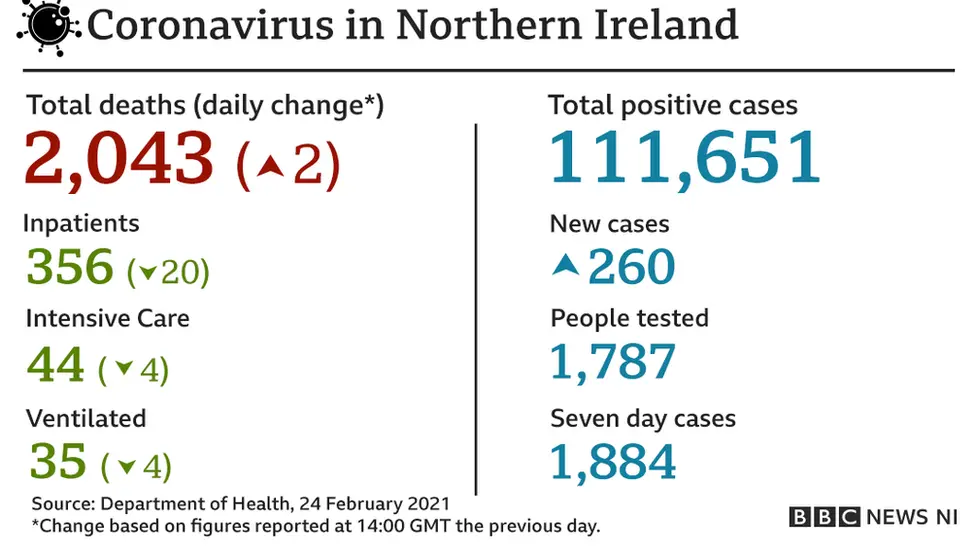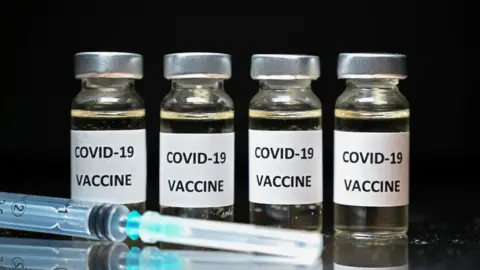Covid-19: Robin Swann says caution not recklessness needed with Covid easing
 Press Association
Press AssociationIt is better to be "too cautious than reckless" when it comes to easing NI's coronavirus lockdown restrictions, Robin Swann has said.
The health minister said he did not want people to jump to conclusions about when measures could be eased.
The executive is due to publish its pathway-to-recovery blueprint on Monday.
Mr Swann warned: "We need a sustainable way out of this, and durable foundations for the future."
His comments came as two more Covid-19 related deaths were recorded by the Department of Health in Northern Ireland.
The department's coronavirus death toll now stands at 2,043.
The latest figures, released on Wednesday show 260 new positive cases of the virus in Northern Ireland.
There are also 356 people being treated for Covid-19 in hospitals, with 44 of those patients being treated in intensive case units (ICU), of those patients in ICU, 35 are ventilated.

Speaking at Stormont's press conference on Wednesday, Mr Swann also defended the executive's initial decision to agree a phased reopening of schools in NI.
On Monday, the DUP said it wanted the executive to "revisit" the plan and allow more year groups to return before Easter, as all schools in England will reopen on 8 March.
But Mr Swann said NI's medical advice was to "act with caution and to carefully assess and monitor the impact of reopening in order to minimise the risk of R once again exceeding one".
"Whilst I note England have decided to open all schools from March 8th, It's also important to recognise that Scotland, Wales and the Republic of Ireland have all decided on something else.
"We should not apologise for taking our own decisions. Otherwise, what's the point in devolution?"
He added that he did not want to risk reopening too quickly, and risk another Covid surge in spring or early summer.
"I'd rather be too cautious than reckless, especially when we know the damage and heartache this virus can bring.
"I don't want to have to look a grieving family or a devastated health worker in the eye, and say sorry we opened up too quickly."
'Slow climb out of restrictions'
Later on Wednesday, DUP leader and First Minister Arlene Foster repeated her view that the executive should revisit the plan for schools when it meets on Thursday.
"We very much want to find consensus tomorrow, as first minister that is the job I have to engage in, but it would be wrong not to revisit the education matter, given what we've seen happening across the other jurisdictions in the UK and Republic of Ireland," she told BBC Newsline.
She questioned why the Republic of Ireland was moving to get all pupils back into classrooms quicker than the NI Executive was, given its roll-out of the vaccine programme has been slower.
But Deputy First Minister Michelle O'Neill said "nothing has changed" with the advice initially given to ministers last week, and that she supported the current plan.
"Just because Boris Johnson has made an announcement does not mean we jump to that tune," she added.
"It is going to be a slow and gradual climb out of restrictions but what I want us to do on Monday is paint a picture for the public, what it looks like, how we're going to achieve it and what are the parameters for how we move further and further out of lockdown."
In the Republic of Ireland a further 56 deaths were added to official figures on Wednesday.
It brings the total number of coronavirus-related deaths in the country to 4,237.
Ireland's National Public Health Emergency Team also said there have been another 574 confirmed cases of Covid-19.
'Seasonal benefit in spring'
On Tuesday the Department of Health confirmed that the South Africa variant had been detected in Northern Ireland.
It is the first time the variant has been found in Northern Ireland, it was previously detected in the Republic of Ireland last month.
 Getty Images
Getty ImagesNI's Chief Medical Officer Dr Michael McBride said cases of Covid-19 were "heading in the right direction", but stressed that just under 300 cases were currently being recorded each day.
However, he said the pace of NI's vaccination programme was "significantly" ahead of schedule, with more than half a million jabs issued.
The latest figures from the department show that 478,825 people have received their first vaccine, and 31,345 second doses have now been administered.
"We are almost certainly in a better position than we were earlier in the year... as spring comes we expect a seasonal benefit in relation to the transmission of Covid, it is right that we are hopeful and begin to look to the day where we might emerge from the restrictions in place," added Dr McBride.
Who is eligible for a Covid vaccine in NI?
The Department of Health began rolling out its programme before Christmas, with staff in the health service among the first to be offered the vaccine, as well as residents in care homes and people aged over 80.
It has since extended eligibility to a number of groups:
- Over 75s to over 65s
- People who are clinically extremely vulnerable
- People who are not clinically extremely vulnerable but who may have a milder condition that would make them vulnerable to the virus
- People aged 18 and over who are carers, who are now being asked to go through a health trust co-ordinator or be called by their GP
On Wednesday, the Department of Health said people with learning disabilities in Northern Ireland will now be called for vaccination by their GPs, if they have not already been called to receive it.
Dr Patricia Donnelly, head of NI's vaccination programme, gave a breakdown of the number of people in those groups who have received their first vaccine.
As of 24 February, the following had received first doses:
- 95% of over-80s
- 90% of 75-79
- 84% of 70-74
- 69% of 65-69
- 39% of people who are clinically extremely vulnerable and vulnerable
Other priority groups are currently expected to receive their first vaccine in spring, with the majority of adults in NI likely to receive their first dose in summer.
